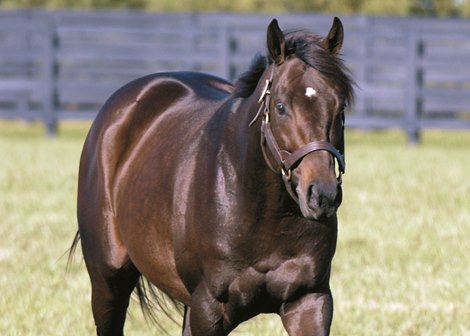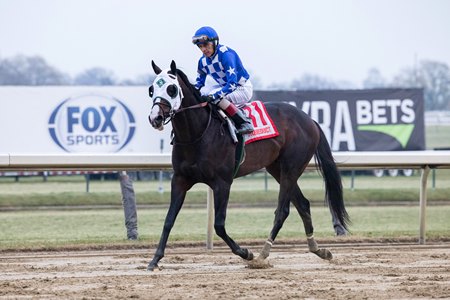The length of time that a stallion can potentially stand at stud can lead to tremendous variation in generational intervals. For example, looking at the pedigree of the 1973 English 2,000 Guineas (G1) victor, Mon Fils, we find that his sire line contained just one horse foaled after World War II, and that his great-grandsire Hurry On was foaled no less than 60 years before Mon Fils' classic triumph.
By way of contrast, when the first foals by the newly arrived Arabian Lion arrive in 2024, they will be only 10 years younger than their grandsire Justify and only 42 years younger than their great-great-great-great grandsire, Storm Cat. That's six generations in 18 years less than the first three generations of the male line of Mon Fils.
These types of generational offsets can result in some very unusual pedigrees. For example, since there are still around 20 sons of Storm Cat at stud in the United States, including grade 1 sire Freud, and since Justify's daughters are already going to be 4-year-olds of 2024, it would hypothetically be possible to have a mating that gave inbreeding to Storm Cat at 2x6.
That's a theoretical example, but a fascinating real-life instance can be found in the pedigree of Hoist the Gold , who produced a decidedly grade 1-level performance Dec. 2 in Aqueduct Racetrack's freshly demoted grade 2 Cigar Handicap—scoring by 4 1/2 lengths while running an exceptional 109 Beyer Speed Figure. The 4-year-old was making his 26th start and his 10th of 2023, and he was recording his second black-type triumph, the first having come in the Oct. 6 Phoenix Stakes (G2) at Keeneland.
Hoist the Gold's victory came just a year shy of half a century after his great-grandsire, Triple Crown winner Seattle Slew, was born, and 34 years since the birth of his grandsire A.P. Indy. His sire, Mineshaft, has the honor of being the only U.S. Horse of the Year to represent A.P. Indy, achieving that status after a 4-year-old season in which he won seven of nine starts, all in stakes, including the Pimlico Special Handicap (G1), Suburban Handicap (G1), Woodward Stakes (G1), and Jockey Club Gold Cup (G1). Overall, Mineshaft emerged victorious in nine of his 11 outings stateside, beginning in November of his 3-year-old season, having initially failed to make much impression in seven outings in Europe.

Tacit Approval, the dam of Hoist the Gold, won twice in California, and is dam of three winners with her first three foals. Tacit Approval is out of Punch Appeal, a Successful Appeal daughter who won six of 12 starts at 2, winning the Kentucky Cup Juvenile Fillies Stakes, Chipiski Stakes, JJ's Dream Stakes, Pocahontas Stakes, and the richly endowed ($250,000 back in 2004) Delta Princess Stakes, which she took by 5 1/2 lengths.
Punch Appeal is the only stakes winner in the first four dams, other than Hoist the Gold. The fourth dam, Nickle Note, is half sister to a pair of relative minor stakes winners, and is out of Miss Royal Kret, a half sister to the dam of Master Derby, winner of seven graded stakes, including the Preakness Stakes (G1), Blue Grass Stakes (G1), and Louisiana Derby (G2) in 1975. Miss Royal Kret is out of Our Kretchen, one of four siblings who were by Crafty Admiral out of the imported English stakes winner Adjournment. Those four were her dam's only Thoroughbred foals, the others in addition to Our Kretchen being stakes winners Master Palynch and Frimanaha (also dam of Bohemian Grove, a stakes winner in the U.S. and group winner in Ireland and Australia) and Crafty Princess, dam of Test Stakes heroine Princess Roycraft and granddam of good sire Crafty Prospector. Between them, the three sisters Our Kretchen, Frimanaha, and Crafty Princess are also ancestresses of more than 100 stakes winners, nine grade 1, including Var, successful in the Prix de l'Abbaye de Longchamp (G1) and a major sire in South Africa; Game on Dude, winner of eight grade 1 events; and Wild Spirit, a Chilean star who captured three graded events in the U.S., including the Ruffian Handicap (G1).
What makes the pedigree so interesting is the generational offset between the two halves of the pedigree, with the paternal side of Hoist the Gold's family tree being far older than the distaff side. In fact, the oldest horse in the third generation on the sire's side was born in 1970, where the four horses in the third generation on the dam's side were all foaled between 22 and 26 years later. The most interesting of those four horses in the context of this mating is Pulpit, who is responsible for Hoist the Gold's maternal grandsire, Tapit . A look at Pulpit's pedigree shows that he is by A.P. Indy out of a mare by Mr. Prospector, which makes him a three-quarter relative to Hoist the Gold's sire, Mineshaft. It also means that he has A.P. Indy 2x4, A.P. Indy's fourth dam Missy Baba (through the three-quarters related Lassie Dear and Toll Booth) 6x8x7, and perhaps even more unusually Mr. Prospector 3x5x6x7x5.
Oddly enough, Mineshaft actually has another 2023 stakes winner, the juvenile Low Mileage, whose dam was foaled 18 years after Mineshaft and has even more extreme offset to A.P. Indy, who appears 2x5, with Seattle Slew 3x6x5. For good measure, another top-class sprinter miler, Coal Front , is by a grandson of A.P. Indy out of a Mineshaft mare, with Seattle Slew 4x4x4.








